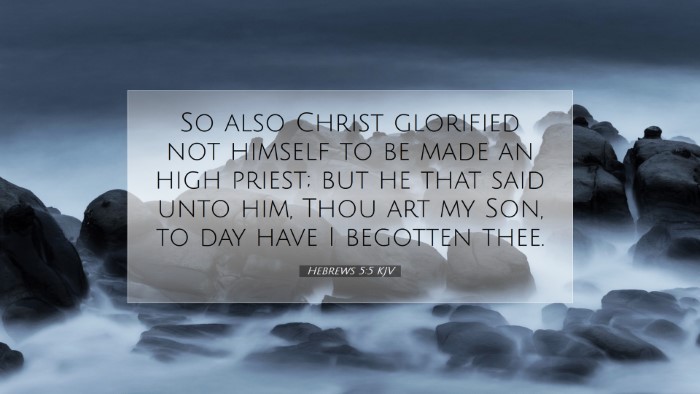Old Testament
Genesis Exodus Leviticus Numbers Deuteronomy Joshua Judges Ruth 1 Samuel 2 Samuel 1 Kings 2 Kings 1 Chronicles 2 Chronicles Ezra Nehemiah Esther Job Psalms Proverbs Ecclesiastes Song of Solomon Isaiah Jeremiah Lamentations Ezekiel Daniel Hosea Joel Amos Obadiah Jonah Micah Nahum Habakkuk Zephaniah Haggai Zechariah MalachiHebrews 5:5
Hebrews 5:5 KJV
So also Christ glorified not himself to be made an high priest; but he that said unto him, Thou art my Son, to day have I begotten thee.
Hebrews 5:5 Bible Commentary
Commentary on Hebrews 5:5
Hebrews 5:5 states: "So also Christ did not glorify himself to become High Priest, but it was He who said to Him: 'You are My Son, today I have begotten You'" This verse reflects the profound understanding of Christ's role and His divine calling as High Priest.
Contextual Analysis
The author of Hebrews presents a compelling case for Christ's superiority, emphasizing His unique position as both the Son of God and High Priest. This verse connects to a broader theme of humility and the divine process of appointment to sacred offices.
The Divine Appointment of Christ
As Matthew Henry notes, Christ did not presume to take on the office of High Priest by His own will or personal ambition. Instead, He was appointed by God, reinforcing the notion that true authority in spiritual matters comes from divine ordination, not human ambition.
Henry stresses that this illustrates Christ's obedience and submission to the Father, underscoring His rightful appointment. This dimension is essential for understanding not only Christ’s role but the broader principles of authority and servanthood in ministry.
Unique Sonship
Albert Barnes expands on the phrase "You are My Son," explaining that it highlights the unique relationship between God the Father and Jesus Christ. This declaration emphasizes that Christ's authority is inherent in His identity as the Son of God. His role is not self-initiated but rooted in His divine nature and purpose.
Barnes contextualizes this by referencing Psalm 2:7, where the Father affirms His Sonship. This is critical as it establishes not only Jesus’ mediatorial role but also His divine origin, conferring upon Him the authority to mediate between God and humanity.
The Nature of Christ’s High Priesthood
Adam Clarke elaborates on the significance of divine call, emphasizing that Christ’s High Priesthood was established not just by His birth, but through His suffering and obedience. Clarke indicates that this verse forms a pivotal point in understanding the qualifications for the priestly office in the biblical tradition:
- Divine Recognition: Christ's appointment is recognized by God, which is essential for His legitimacy as High Priest.
- Fulfillment of Prophecy: This messianic understanding indicates that Christ fulfills the prophetic hope of a mediator between God and humanity.
- Human Experience: Clarke emphasizes that through His experiences, particularly His suffering, Christ is able to relate to humanity's struggles, providing solace and understanding as a High Priest.
Theological Implications
This verse invites several theological reflections. Firstly, it affirms the doctrine of the incarnation, highlighting how Christ's divine identity as the Son is fundamental to His priestly service. Secondly, it suggests a model for leadership within the Christian community: leaders are called to be humble servants, recognizing that their authority comes from God rather than personal achievement.
Practical Applications
For pastors and theologians, this verse is a reminder of the humility required in ministry. The understanding that Christ did not glorify Himself serves as a teaching tool for church leaders to follow a path of service.
Furthermore, students of the scripture should recognize the importance of divine calling in their lives. Like Christ, believers are invited to submit to God's will for their lives, acknowledging that true effectiveness in ministry arises from a recognition of God’s appointment rather than personal ambition.
Conclusion
Hebrews 5:5 poignantly illustrates the profound union of Christ's divine nature and His appointed role as High Priest. The interplay of humility, divine calling, and the nature of leadership reaffirm not only Christ’s qualifications but also serve as a model for those who seek to follow Him. In an age where personal ambition often overshadows divine calling, this passage calls us back to a biblical understanding of authority rooted in obedience, humility, and the recognition of God’s appointment.


